Flat Point Farm overlooks Tisbury Great Pond, with its pastures rolling down to the shore. Emily Fischer’s grandfather started a dairy farm here in 1939, and the family has lived and farmed at Flat Point ever since. The dairy cows that grazed here gave way to sheep and beef cattle as times changed, and a few years ago, after working at a sheep dairy in upstate New York, Emily and her husband Doug Brush started raising dairy goats. They settled down here in 2005, and are raising two sons, Milo and Leon.
A dairy goat can produce over a gallon of milk a day in peak season, which is too much for a small family to use, even when they’re making some of it into cheese. Emily and Doug froze the excess, and Emily tried using some of it to make soap. That small side project soon grew into a small business that now helps keep the family going. The goats live in two sheds. Bungalow Bill — the buck or “goat daddy” — lives in his own pen and shed for most of the year. He’s a friendly, pure-bred Alpine goat who likes to ejaculate into the air and pee on his own face, according to Emily. That doesn’t sound very appealing, but it doesn’t get in his way during his annual visit to the female goats, Holly and Shirley. Once a year, around late November, Bungalow Bill shacks up with them for a few weeks, and if all goats well, the kids are born the following spring.
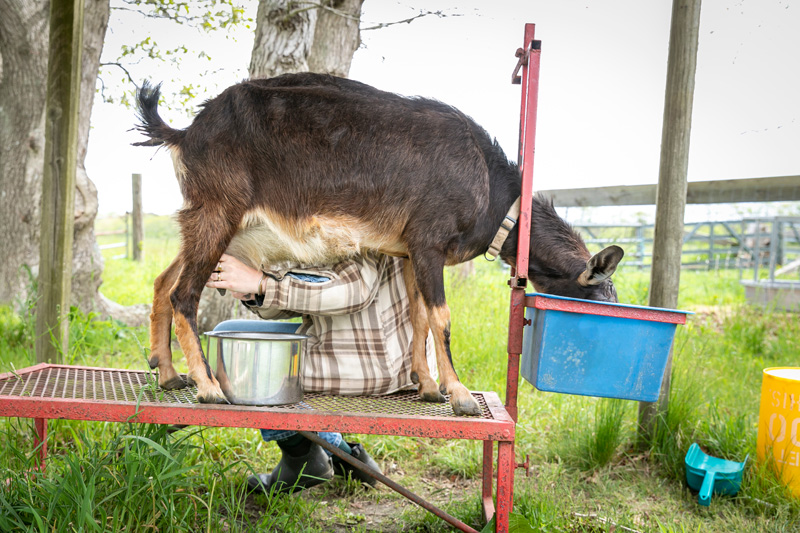
An average goat pregnancy lasts 150 days, and goats can have single, twin, triplet, or even quadruplet pregnancies, though they most commonly average two births per pregnancy. This year Holly and Shirley each had twins, and all four kids were girls. “We had quite a time naming the first two,” Emily says. “They were born on May 4th, so we wanted to do ‘Star Wars’ themed names, but Leon [age 9] really wanted to be involved, and he wanted to call them Rainy and Drizzle.” They compromised with the names Rainy and Sun Rae. They’ll keep those two, while the other pair will go to a new home.
The kids are separated from their mothers at birth and bottle-raised, starting on their mothers’ milk, which makes them very friendly to humans. Emily and Doug milk the goats twice a day, by hand. You can’t skip a milking, and you can’t be late for it, or else the goats get painfully engorged udders and their milk supply starts to dry up.
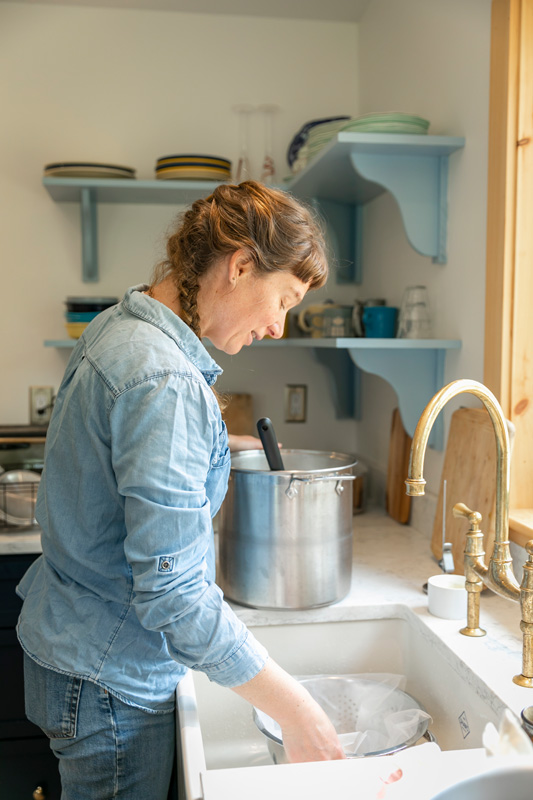
Doug makes paneer and chèvre with some of the milk, but cheesemaking is a finicky process, and the permits and dishwashing required made it too impractical as a business venture, Emily says. The remainder of the milk is frozen in 75-ounce containers, which is part of the process of getting it ready for soapmaking.
“I’m making soap because I wanted to do something with the farm that kept me engaged with farming,” Emily says. She works in what they call the family’s “Craft Palace.” The Craft Palace is set in a wooded area behind a house, and was designed by Emily’s mom, Christa, with architect Annie Fisher, a cousin of the family. Christa and Emily’s sister, Lila, also uses the space, though the soap business sprawls over most of the room. Emily makes all of the soap herself, but Doug is the lead salesman of the operation. Melissa Patterson helps her with graphic design and makes the labels, and she also hires an accountant, but Emily makes and wraps all the soap herself. She likes to work alone, listening to NPR, and doesn’t want to worry about imposing her perfectionism on an employee. “I like that I can be really nitpicky about soap,” she says, “and I don’t want to give someone a hard time about not wrapping it the right way.”
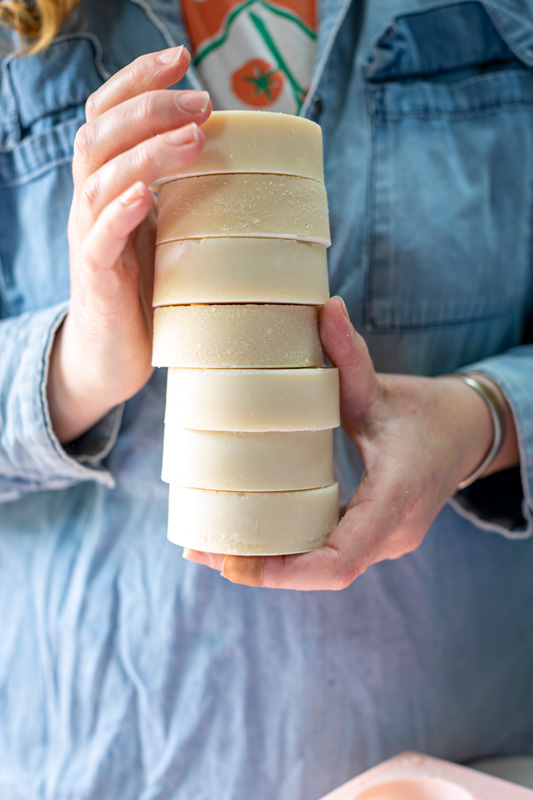
The process of making basic bar soap isn’t too complicated. Emily takes a container of goat milk out of the freezer and sprinkles lye on top of it. The chemical reaction between the milk and the lye produces heat, which melts the milk. She stirs until the lye dissolves, like sugar in water. If the lye doesn’t get broken up enough, it will burn a chunk of milk to bright yellow, creating a problem piece that needs to be fished out. The next step is to add a blend of oils and fats, including coconut oil, olive oil, shea butter, safflower oil, and palm shortening. Although palm shortening can be grown very efficiently, the palm oil industry has been responsible for some major environmental problems, wiping out vast swaths of rainforest and threatening orangutan populations. Emily uses palm shortening that’s green-certified and organic, and has also developed a line of soaps that don’t have palm oil, and are scented only with pure essential oils. The fragrances are added last, then she pours the soap into molds to set overnight. In the morning, she unmolds them and sets them out to cure for three weeks. The workspace is fragrant with scents — sandalwood, beach plum, rosemary, mint, rose geranium, honeysuckle, fig, and lavender.
Wrapping the soap is part of the artistry. Emily wraps the basic bar soaps in handmade, block-printed Japanese paper. The felted soaps are swathed in carded wool from the farm’s sheep. The sheep were sheared in mid-May this year. Christa picks through the wool to remove the caked-on dirt and hay, then it goes to a place in Vermont to be washed and carded. Back in the Craft Palace, Christa dyes it, using plants from her own dye garden just outside, along with some other organic dyes. Emily wraps billowy undyed wool around a bar of soap, then pulls out thinner bands of colored wool to wrap decoratively around it. The wool is gently exfoliating, and can act as a washcloth as well as making the soap less slippery.
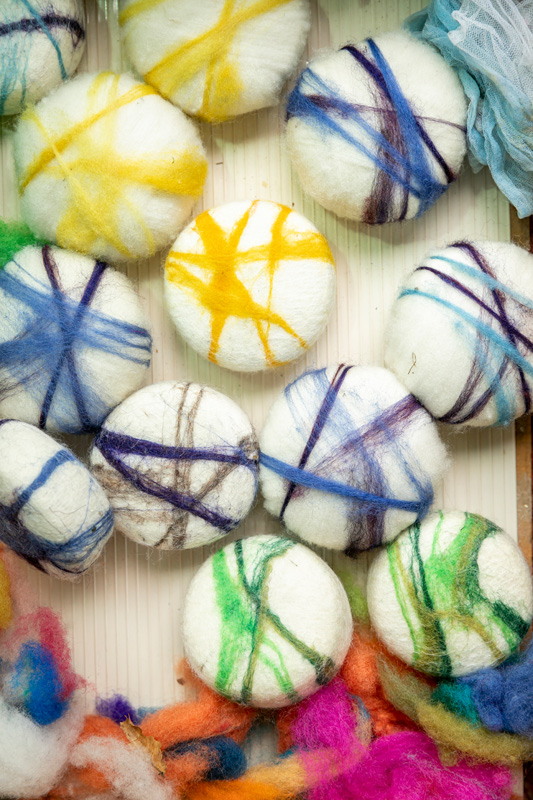
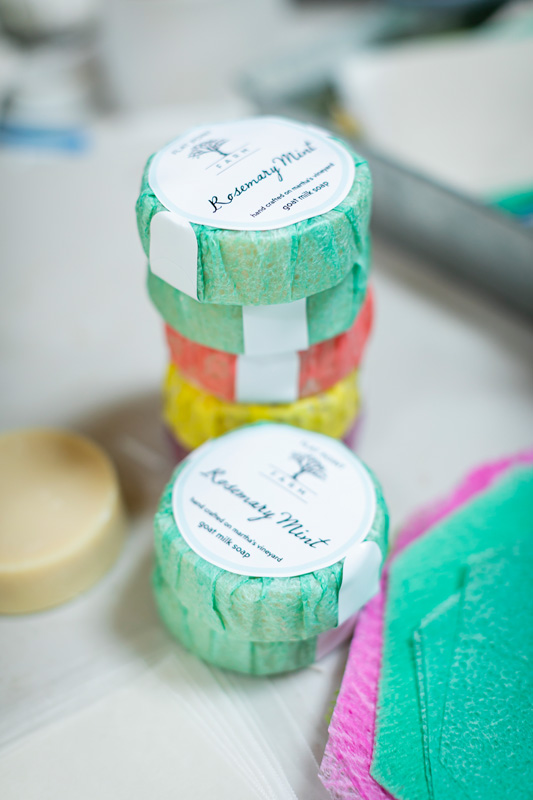
In addition to bar soap, Emily also makes a liquid soap made with potassium hydroxide, rather than lye. She cooks it in a slow cooker until it turns into a paste, strains and thins it with distilled water. It’s a more labor-intensive process than making the solid soaps, but it’s a popular product. Her other products include lotions made with goat milk, and a solid dish soap. It’s a creative enterprise that grows and evolves slowly, moving with the rhythms of the Island’s life and the farm’s seasons. She has perfected her products over the years, incorporating new ideas while keeping the business closely connected to the farm.
Emily’s online presence and marketing is bare bones, just an Etsy shop (etsy.com/shop/FlatPointFarmGoods) and a website (flatpointfarm.com), but you can find her or her husband Doug selling soap and more every week at the West Tisbury Farmers Market and artisans markets. The soap is also available at a growing number of local retailers, listed on her website. After the busy summer season passes, the goats will dry out again, and get ready for another year. In the spring there will be new kids in the barn again, and soap curing on its racks, smelling of everything from sandalwood to mint.

